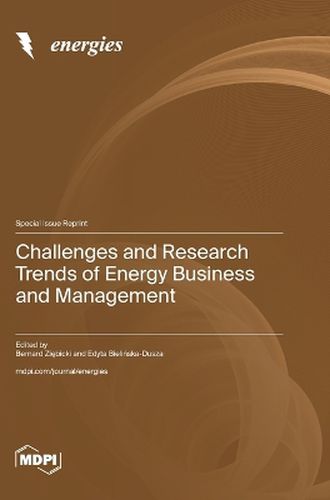Readings Newsletter
Become a Readings Member to make your shopping experience even easier.
Sign in or sign up for free!
You’re not far away from qualifying for FREE standard shipping within Australia
You’ve qualified for FREE standard shipping within Australia
The cart is loading…






This title is printed to order. This book may have been self-published. If so, we cannot guarantee the quality of the content. In the main most books will have gone through the editing process however some may not. We therefore suggest that you be aware of this before ordering this book. If in doubt check either the author or publisher’s details as we are unable to accept any returns unless they are faulty. Please contact us if you have any questions.
Energy transformation significantly redefines the business models of enterprises in the energy sector, putting difficult decisions before them in terms of both strategy and operationalization. This shift aligns with climate protection policies, Industry 4.0 principles, and advanced technologies like artificial intelligence, blockchain, and IoT. The technological revolution is set to significantly alter lifestyles and business operations in energy production, supply, and distribution. This revolution demands that managers equip their companies and staff for upcoming challenges, emphasizing customer relations, networking, eco-development, and energy efficiency. In addition, companies from the energy sector are particularly susceptible to macroeconomic and environmental factors, such as government regulations, fluctuations in demand, price pressure on commodity exchanges, and measures to prevent global warming and engage in the creation of renewable energy. Furthermore, the situation related to the SARS-CoV-2 pandemic has forced many companies to rethink their actions. However, some recorded a significant slowdown in technology implementation and research and development. We do not know whether the long-term effect will influence the energy paradigm. This work aims to create new theoretical and empirical works on changes to energy sector management, including new business models and the use of Industry 4.0 technology, and their impact on organizations, digitization, companies' energy self-sufficiency, and investments supporting the so-called green economy.
$9.00 standard shipping within Australia
FREE standard shipping within Australia for orders over $100.00
Express & International shipping calculated at checkout
This title is printed to order. This book may have been self-published. If so, we cannot guarantee the quality of the content. In the main most books will have gone through the editing process however some may not. We therefore suggest that you be aware of this before ordering this book. If in doubt check either the author or publisher’s details as we are unable to accept any returns unless they are faulty. Please contact us if you have any questions.
Energy transformation significantly redefines the business models of enterprises in the energy sector, putting difficult decisions before them in terms of both strategy and operationalization. This shift aligns with climate protection policies, Industry 4.0 principles, and advanced technologies like artificial intelligence, blockchain, and IoT. The technological revolution is set to significantly alter lifestyles and business operations in energy production, supply, and distribution. This revolution demands that managers equip their companies and staff for upcoming challenges, emphasizing customer relations, networking, eco-development, and energy efficiency. In addition, companies from the energy sector are particularly susceptible to macroeconomic and environmental factors, such as government regulations, fluctuations in demand, price pressure on commodity exchanges, and measures to prevent global warming and engage in the creation of renewable energy. Furthermore, the situation related to the SARS-CoV-2 pandemic has forced many companies to rethink their actions. However, some recorded a significant slowdown in technology implementation and research and development. We do not know whether the long-term effect will influence the energy paradigm. This work aims to create new theoretical and empirical works on changes to energy sector management, including new business models and the use of Industry 4.0 technology, and their impact on organizations, digitization, companies' energy self-sufficiency, and investments supporting the so-called green economy.